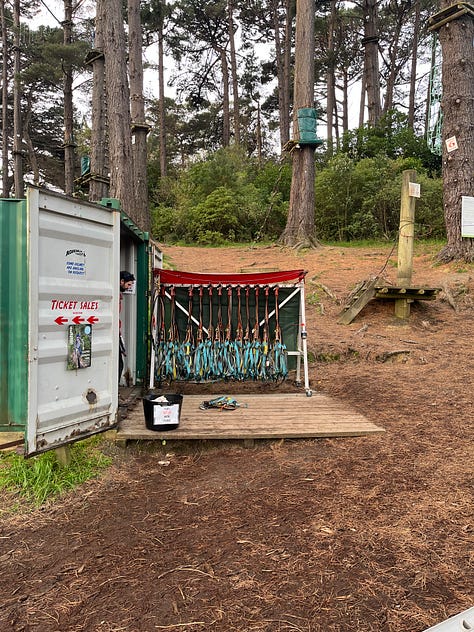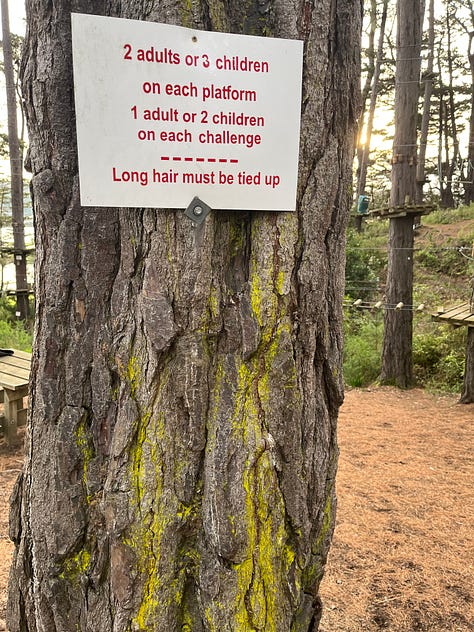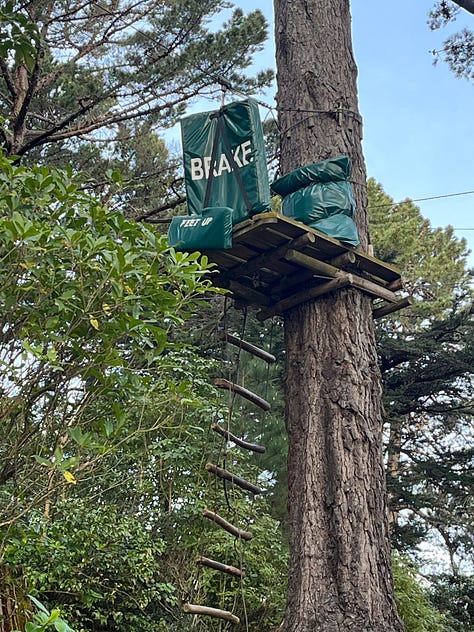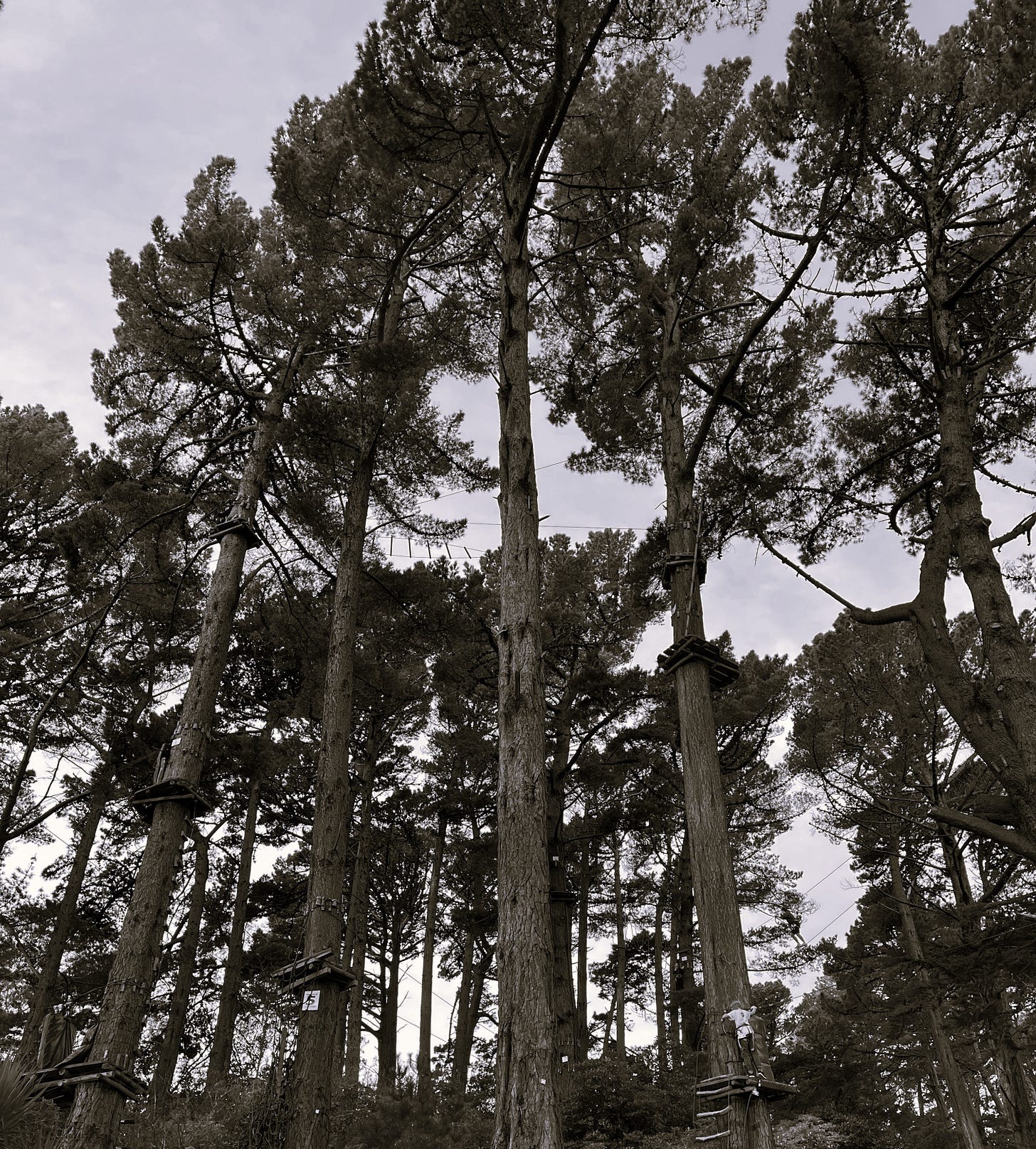Roped together
When to hold on and when to let go
When I try to explain the miniature scale of this country to non-New Zealanders, I use myself as a measuring stick. I could easily do it right now.
“Just yesterday,” I might say, “I went to the toilet at Wellington Airport in a cubicle next to the minister of finance — our second most powerful politician. She had just been through the security check like everybody else, probably in her socks.
“Then I boarded the same flight as a cult New Zealand band. They stashed a trumpet in the overhead locker next to my hot tongs.
“After we took off, I heard one bandmate tell another about the time he got stuck on a ski-lift. He was stranded far from help with a dying phone and the early signs of hypothermia: it was possible he’d have to survive the night. He told this story with strange fondness, and loudly enough for everybody in the plane’s midsection to enjoy.
“Bands are nothing. I’ve rock-climbed with a Prime Minister. She was promoting local tourism at the time, and I was a cub reporter. I climbed behind her, clipping on where she clipped off, my nose inches from her boots. I didn’t look up. Her bottom would have been in my direct line of sight, and I wanted to show some respect.
“I’ve peed into a cup for the wife of a Prime Minister. It was legitimate for her to request this; she was a GP.
“At some point in our lives, everybody has been an extra in a Peter Jackson movie. I’m in King Kong in a platinum wig, and we all know a hobbit.
“In this country you might see someone you know on the TV news any night of the week. Maybe they’ve trod on a fossil, or been vox popped near Parliament. Maybe they’re standing at a police cordon telling a reporter they couldn’t believe this kind of thing could happen on such a quiet street.
“My flatmate once won Mastermind and was basically mobbed for twenty years. He won our pink leather lounge suite on a different gameshow; the entire country watched him win it.”
At this point I might crack my knuckles.
“I’ve been on a date with an All Black. You don’t have to be a pop star or a swimsuit model because they don’t care about that. They only care about the jersey. You just take advantage of their most recent test match defeat and ask them out soon after, while they’re emotionally broken.
“Once I was set up with a telegenic MP. We shared a muffin on our date. It was glum and there was no spark. But it wouldn’t have worked even if there was, really. I didn’t agree with him on capital gains tax.”
Here I might sigh and pinch the bridge of my nose. “Every New Zealander I’ve ever dated has had a traceable connection to the New Zealander I dated before him. This raises the sexual stakes and lowers them at the same time, so it’s best to have no sex at all.
“My point is that anything of national significance could happen to you here. Mainly, nothing does. The difference is up to you and that, my naive new friend, is New Zealand.”
That long-ago rock-climb wasn’t a real one. I mean, the cliffs were real, but the route was made easy by iron rungs screwed into the rock. You could hardly call me an alpinist.
That’s why I needed to swallow my panic on Monday, at Ferg’s indoor climbing centre. I’d volunteered to belay for George’s Scout pack. I’d belayed years ago and had a dim memory of enjoying it, but had forgotten that it’s a dreadful responsibility, the taut rope in your hands being the difference between a smiling, safe climber, high on a wall, and a broken heap of limbs on the floor.
For someone who can keep two kids and two pets alive but neglects to drink enough water, whose pot-plants are hairless and dying, whose tyres are never inflated enough and whose emergency kit has magnetic mini chess but not nearly enough toilet paper, belaying another person is probably a duty too far. Plus, on a night like this, not only is somebody else’s child going to be swinging off my rope but their Dad will be watching while they do it.
Dads love watching this shit.
The first thing that happened at Ferg’s, thankfully before the safety demonstration, was a sudden, violent hailstorm. It hammered against the tin roof — you had to give up speaking and let nature express dominance.
It was hard enough to hear the briefing anyway: the instructor was soft-spoken as she showed the gaggle of not entirely attentive Scouts how to lock themselves onto the climbing rope (two carabiners, facing opposite ways! Get your partner to check!). She glided through the demo, serenely explaining what we adults should do if our Scout was to lose footing high up. Another climber dangled helpfully in mid-air to show us how controlled things should be in a crisis; our instructor loosened their shared rope using a brake mechanism, gently lowering him to the floor. He dropped smoothly, like a spider on a line of its own silk.
After that we were paired up, tested for our knowledge, and signed off to climb. One of my Scouts was fast on the wall — keeping the rope taut for him was a workout. That’s the job, to avoid slack by pulling the dead rope through a locking device using set hand movements (Make a V! To the knee! One, two, three!). A slack rope means there’s further to fall. Before I knew it, my Scout was at the top and ringing the bell, as if for a heavenly bartender.
Suddenly there were Scouts in every airspace, on every fixed rope. One girl speed-climbed nimbly to the ceiling; another swung happily from the underside of a bulge in the wall. I saw George inching up a rope ladder, two adults and another Scout calling encouragement; I spent half an hour with a tentative Scout whose pace was better matched to mine, but by the end and a series of dogged attempts he’d outdone himself, making it halfway up the wall in a triumphant personal best. I was so pleased I had to whoop, even though my arms were on fire and my neck almost locked from craning. Loosening each Scout and easing them to the floor was the sweetest sort of relief.
I’m glad I was busy, because watching children at mighty heights is not for the faint-hearted. Earlier in the week I drove to a climbing forest just outside the city. It was late afternoon, and the Scouts had been testing their mettle in a giant stand of pines for a couple of hours. I was there to collect a carload of kids and take them back to the Den.
Under the canopy, my eyes took a few minutes to adjust to the gloom. I couldn’t believe what I was seeing. Kids on tiny perches as high up as 30 metres; zipping between platforms on fixed cables, inching along tightropes using safety clips; scrambling across rope webbing strung between trees, or scaling old-school wooden rungs hammered into trunks; it was enough to make a middle-aged mother want to sit down. I had no idea where my kid was; they all look the same when they’re up beyond reach.
The available light played tricks on me; one child stepped across a rope bridge I couldn’t see, as if he was walking on air. Another whizzed over my head, his sneaker soles flashing orange. I heard the metallic whirr of a flying fox, and a Scout flew along a cable with a loud YEAAAAH! and body-slammed into a padded cushion printed with the word BRAKE. But more unnerving were the silent ones, nonchalantly dangling 80 feet above as if it was no big thing that they could see the distant South Island from their tree.
There were instructors in red hoodies all over the forest, casually scaling up to clip or unclip a Scout. “Thank you,” I told them weakly, as we left. Thank you for exposing my child, with his soft young spine and precious 12-year-old skull, to the happiness of risk. For offering him steps made of sticks and air. For checking his carabiners, harness, and rope. For keeping his mother away as he climbed.



This week we said goodbye to my husband’s elegant, bohemian aunt — an artist, poet, gourmet and thinker, descended from brilliance, herself brilliant, and married to it.
We flew down to Christchurch on Friday morning, the alps generously buttered in snow. The city glittered in the winter sun. I haven’t visited it often since the earthquake, but the empty, chain-linked plots where damaged buildings used to stand have given way to scores of new ones — smart terraced townhouses and luxury apartments, manicured hedges and spotless paving, and the looming white shell of a new stadium.
It’s a city with few of the old reference points, except for Hagley Park and the slow wind of the Avon River. I drove from block to shining block, needing dictated directions.
The service was to be held at Governor’s Bay. I’d never driven from Christchurch in that direction, where you have to conquer a dramatic upsweep of volcanic rock and then descend to the coastline below. After all the newness, I wasn’t prepared for the stately heritage houses up on the Cashmere hills sitting high above the rubble and liquefaction of 2011, their pretty gables and painted shutters recalling what this city must have been like before; before the quake, before the mosque attacks, when trauma happened to people privately, behind closed doors and privet hedges, and not collectively, publicly, tragically.
Governor’s Bay was still as a millpond. The edges of the map rose from the water without preamble: no beach or shingle that I could see. The hills had crisp outlines and two shades of green, like a Rita Angus painting.
We found the church — gabled stone, with diamond-paned windows. We walked across pine needles to find her resting place drenched in sunshine, under low-swooping native birds. Soon after 2pm she was carried in a pine box draped in a canvas painted by her husband, and rested on planks above a cool square of air.
There were simple, lovely speeches. The mourners truly had loved her, as plain-speaking as she was. She didn’t want fuss (“No doggerel,” a composer said to me afterwards, his face shining with approval). The great and the good came to say goodbye and eat small rectangles of sandwich at the local pub; there were all ages represented, statement glasses, interesting hats, and a woolly dog.
When the time came, helpers from every direction stepped in to help the family lower her into the earth. My husband, who loved her too, firmly held one of several ropes looped under her coffin, matched by a mourner doing the same on the opposite side. It took effort to control her descent, with strangers working together to loosen the lowering straps slowly and evenly. Watching them do something so loving and respectful, so ancient and final, it seemed for a minute that everyone present breathed together.
Then the rope was paid out and let go.
In loving memory of Lee Trusttum




"the alps generously buttered in snow." - just glorious wording, Leah.
Your husband's aunt sounds a remarkable woman. My condolences.
Beautiful writing as always, Leah.